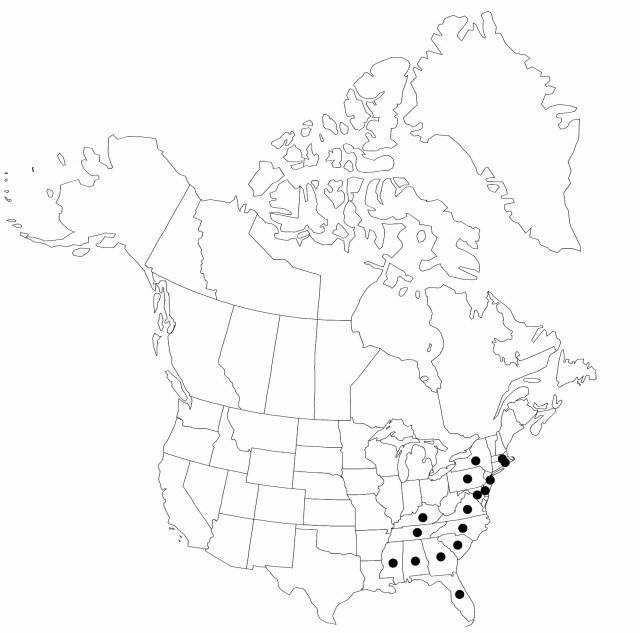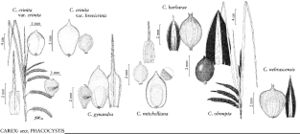Difference between revisions of "Carex mitchelliana"
Amer. J. Sci. Arts 44: 84. 1843.
FNA>Volume Importer |
FNA>Volume Importer |
||
| Line 26: | Line 26: | ||
|elevation=0–500 m | |elevation=0–500 m | ||
|distribution=Ala.;Del.;Fla.;Ga.;Ky.;Md.;Mass.;Miss.;N.J.;N.Y.;N.C.;Pa.;R.I.;S.C.;Tenn.;Va. | |distribution=Ala.;Del.;Fla.;Ga.;Ky.;Md.;Mass.;Miss.;N.J.;N.Y.;N.C.;Pa.;R.I.;S.C.;Tenn.;Va. | ||
| − | |discussion=<p>No specimens are known from Connecticut; Carex mitchelliana may be expected to occur there. The species is known from fewer than 100 extinct and extant populations located predominantly along the Atlantic and Gulf coastal plains from Massachusetts to Alabama. Allozyme data demonstrated that the taxon, although not common, is genetically diverse and is closely related to the progenitor of the species complex (L. P. Bruederle et al. 1989).</p> | + | |discussion=<p>No specimens are known from Connecticut; <i>Carex mitchelliana</i> may be expected to occur there. The species is known from fewer than 100 extinct and extant populations located predominantly along the Atlantic and Gulf coastal plains from Massachusetts to Alabama. Allozyme data demonstrated that the taxon, although not common, is genetically diverse and is closely related to the progenitor of the species complex (L. P. Bruederle et al. 1989).</p> |
|tables= | |tables= | ||
|references={{Treatment/Reference | |references={{Treatment/Reference | ||
| Line 53: | Line 53: | ||
|publication year=1843 | |publication year=1843 | ||
|special status= | |special status= | ||
| − | |source xml=https://jpend@bitbucket.org/aafc-mbb/fna-data-curation.git/src/ | + | |source xml=https://jpend@bitbucket.org/aafc-mbb/fna-data-curation.git/src/8f726806613d60c220dc4493de13607dd3150896/coarse_grained_fna_xml/V23/V23_685.xml |
|genus=Carex | |genus=Carex | ||
|section=Carex sect. Phacocystis | |section=Carex sect. Phacocystis | ||
Revision as of 17:10, 18 September 2019
Plants cespitose. Culms acutely angled, 40–140 cm, scabrous. Leaves: basal sheaths brown; sheaths of proximal leaves bladeless, scabrous, fronts red-brown to copper-brown, spots absent, indistinctly ladder-fibrillose, apex U-shaped; blades hypostomic, 13–35 cm × 3–8 mm, papillose abaxially. Inflorescences: peduncle of proximal spike 0.6–3 cm; proximal bract longer than inflorescence, 1.5–6.2 mm wide. Spikes 2–4 pistillate, 1–2 staminate; pendent; proximal pistillate spike 3.1–7.9 cm × 3.6–7.4 mm. Pistillate scales pale to copper-brown; 2.9–6.3 mm (including awn), apex of body truncate, awned, scabrous. Perigynia ascending, pale brown, 1–5-veined abaxially or veinless, scarcely inflated, loosely enclosing achenes, ovoid, 2.5–3.9 × 1.3–2.1 mm, dull, apex acute, papillose over entire surface; beak 0.1–0.3 mm. Achenes not constricted. 2n = 66.
Phenology: Fruiting Jun–Aug.
Habitat: Swamps, floodplain forests, wet meadows, stream edges, margins of lakes and ponds, roadside ditches
Elevation: 0–500 m
Distribution

Ala., Del., Fla., Ga., Ky., Md., Mass., Miss., N.J., N.Y., N.C., Pa., R.I., S.C., Tenn., Va.
Discussion
No specimens are known from Connecticut; Carex mitchelliana may be expected to occur there. The species is known from fewer than 100 extinct and extant populations located predominantly along the Atlantic and Gulf coastal plains from Massachusetts to Alabama. Allozyme data demonstrated that the taxon, although not common, is genetically diverse and is closely related to the progenitor of the species complex (L. P. Bruederle et al. 1989).
